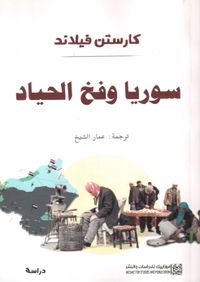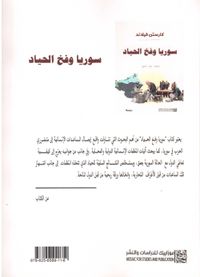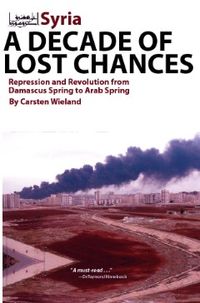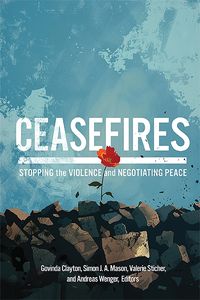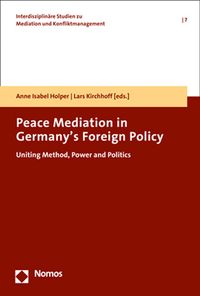Monographies
سوريا و فخ الحياد: معضلات اصال المساعدات الانسانية عبر الانظمة العنيفة
(Translation of: Syria and the Neutrality Trap: The Dilemmas of Delivering Humanitarian Aid through Violent Regimes)
موزاييك للدراسات و النشر, اسظنبول 2024
Syria and the Neutrality Trap: The Dilemmas of Delivering Humanitarian Aid through Violent Regimes
I.B. Tauris, London (UK) 2021
click to get to the book site with I.B. Tauris
Book description:
The Syrian war has been an example of the abuse and insufficient delivery of humanitarian assistance. According to international practice, humanitarian aid should be channelled through a state government that bears a particular responsibility for its population. Yet in Syria, the bulk of relief went through Damascus while the regime caused the vast majority of civilian deaths. Should the UN have severed its cooperation with the government and neglected its humanitarian duty to help all people in need? Decision-makers face these tough policy dilemmas, and often the “neutrality trap” snaps shut.
This book discusses the political and moral considerations of how to respond to a brutal and complex crisis while adhering to international law and practice. The author, a scholar and senior diplomat involved in the UN peace talks in Geneva, draws from first-hand diplomatic, practitioner and UN sources. He sheds light on the UN's credibility crisis and the wider implications for the development of international humanitarian and human rights law. This includes covering the key questions asked by Western diplomats, NGOs and international organizations, such as: Why did the UN not confront the Syrian government more boldly? Was it not only legally correct but also morally justifiable to deliver humanitarian aid to regime areas where rockets were launched and warplanes started? Why was it so difficult to render cross-border aid possible where it was badly needed? The meticulous account of current international practice is both insightful and disturbing. It tackles the painful lessons learnt and provides recommendations for future challenges where politics fails and humanitarians fill the moral void.
Endorsements
“A masterpiece, this book is a riveting call for action to prevent governments that massacre their own citizens from directing who shall, and who shall not, receive donor-funded life-saving emergency help. In a devastating account, Dr. Wieland illustrates how the Syrian regime exploited United Nations’ neutrality and respect for state sovereignty to distort international humanitarian assistance and undermine foreign donors’ intentions. This book is a call for action to prevent governments that massacre their own citizens from directing who shall, and who shall not, receive donor-funded life-saving emergency help."
Jeffrey Feltman, UN Under-Secretary-General for Political Affairs 2012-2018
"The road to hell is paved with good intentions. Carsten Wieland masterfully paints a gloomy picture of an international community’s attempt to help suffering civilians in the Syrian hell. And how their pretensions of neutrality ended up benefitting the perpetrators of those civilians. Neutrality can be a deadly trap. Wieland accurately describes that trap and ways how to get out of hell."
Omid Nouripour, Foreign Policy spokesman of the Green Parliamentary Group in the German Bundestag 2013-2021
"This in an extraordinary book on humanitarian law and practice in the Syria conflict. By a scholar-practicioner with many years of experience studying Syria and acting as advisor to the UN mediator on the country, it is a model of how theoretical concerns and practical experience in policy making can cross fertilize each other.
The study throws invaluable light on the strategies of the Syrian government to control humanitarian aid as a tactic of war; on how UN agencies tried to steer between regime pressures and the need to deliver aid to the victims of war, and on how UN practices themselves, became matters of contestation among and within donor states--between those seeking to preserve norms of neutrality and respectful of state sovereignty and those arguing for robust humanitarian intervention. Especially valuable is how the author matches how contesting legal norms and on-the ground practices interacted in the Syrian conflict, with far reaching consequences for the evolution of global norms on humanitarian practices."
Raymond Hinnebusch, professor of international relations, University of St Andrews Centre for Syrian Studies
“The most convincingly argued call yet to remove the delivery of international humanitarian aid to populations in need from the control of unaccountable governments which use sovereignty as a pretext to divert food and medical supplies to their own supporters - the ultimate exposure of sovereignty as fake neutrality.”
Eberhard Kienle, Research Professor at the Centre des recherches internationales (CERI), Centre national de la recherche scientifique (CNRS) / SciencesPo, Paris
“A highly interesting and original study based on many years of practical and intensive experience of Carsten Wieland, who served as a diplomat and an academic, dealing with the Middle East, Syria in particular, also in the intra-Syrian negotiations under the auspices of the UN Special Envoy for Syria. This book clearly explains the complicated juridical, humanitarian and political dimensions of the various dilemma’s of delivering humanitarian aid during wars. Wieland provides an authoritative guide on how to better deal with delicate humanitarian issues, like those in Syria. It should be highly recommended reading for politicians, humanitarian negotiators, people active in the field of humanitarian aid and other decision makers.”
Nikolaos van Dam, former Dutch diplomat, scholar and Syria expert
- Las trampas de la neutralidad y del asistencialismo humanitario, by Freddy Cante, in: Desafíos, Bogotá (34-2) 2022
- Book Review "Syria and the Neutrality Trap", in: Insight Turkey Vol. 24 no.1, 18 May 2022
- "Syria and the Neutrality Trap", in: The Middle East Journal, March 2022
- Absturz mit Ansage: Krisen in Europas Nachbarschaft, vielen Ländern der arabischen Welt droht weiteres Unheil, by Jan Kuhlmann, in: Internationale Politik, Berlin, February 2022
- The Road to Damascus is Paved with Good Intentions, in: War on the Rocks, by David Adesnik, 9 August 2021
- "Syria and the Neutrality Trap", in: Journal of Peace Research, PRIO, 23 September 2021
Syria - A Decade of Lost Chances: Repression and Revolution from Damascus Spring to Arab Spring
Cune Press, Seattle (USA) 2012
Endorsements:
"Carsten Wieland has established himself as one of the premier contemporary Syria watchers, with his first hand experience of the country and keen analytical mind. This update of his book is a must read for those seeking to understand the current uprising from a balanced point of view. The book’s meticulous command of empirical detail, analytically framed and interpreted, makes it an invaluable and historical record. Particularly strong is Wieland’ analysis of the contradictory personality of Bashar al-Asad, of the power struggles within the regime, of the causes and consequences of missed opportunities for reform that might have headed off revolution and of the counterproductive violent response to protestors that propelled it."
Raymond Hinnebusch, Director at the Center for Syrian Studies, University of St. Andrews
"A fascinating and highly readable book, providing one of the most detailed accounts of the dramatic events in Syria over the past decade and before. Dr Wieland gives an original and critical in-depth analysis of modern Syrian history with a refreshing approach."
Nikolaos van Dam, Syria expert ("The Struggle for Power in Syria") and Dutch Ambassador to numerous Arab and Islamic countries
“Carsten Wieland plumbs the contradictions of contemporary Syrian life and politics. He was among the first Westerners . . . in the early years of Bashar’s presidency . . . to interview Syrian opposition members as well as government officials. He explored the reasons that many young Syrians had such high expectations of their young president even as so many reviled the government and the Baath Party for its corruption and and repression. Their expectations, we now know, were dashed. Wieland is even-handed and measured; he knows Arabic and has lived in Syria for years. Better yet, he listens. Syria - A Decade of Lost Chances is timely and important. Everyone interested in Syria should read this book.”
Joshua Landis, Director, Center for Middle East Studies, University of Oklahoma and Founder of SyriaComment (www.SyriaComment.com)
“Carsten Wieland gives a fascinating in -depth account of the developments in Syria which led to the actual crisis. Whoever wants to get a better understanding of the root causes of Syria’s ongoing revolts, will be enthralled by this vivid account of Syria’s recent political history since Bashar Al Assad became President in June 2000. The early hope for change towards pluralism and democracy - a Damascene spring - was not fulfilled .The tragic story of an unflinching opposition struggling for democracy against a rigid authoritarian minority regime lead by the Assad clan is told on the basis of many interviews with leading figures of the opposition while describing the savage repression of a regime which cannot reform itself and is still not willing to give up its power and privileges. This book is a key to understanding the complicated recent history of Syria and its ongoing turmoil."
Gunter Mulack, President of the German Orient Institute, past German ambassador to Syria
Voices:
"It is one of the most serious books on Syria written since the outbreak of the Syrian revolt in March 2011. The book is a good read for students and lay readers as well as a treasure trove of carefully gleaned facts for scholars.
Wieland -- who serves as a German diplomat and speaks fluent Arabic -- has both lived in Syria and interviewed Syrians during every year of Bashar al-Assad's rule. With a superb command of detail, Wieland manages the almost acrobatic feat of telling the Syrian story from multiple perspectives as it progresses through time. [...]
It will one day be acknowledged as a classic work of scholarship on Syria, alongside Patrick Seale's Asad: Struggle for the Middle East and Philip Khoury's Syria and the French Mandate."
Huffington Post, by Sami Moubayed, visiting scholar at the Carnegie Middle East Center in Beirut
"This is a fascinating and highly readable book, providing one of the most detailed accounts of the dramatic events in Syria over the past decade and before. Carsten Wieland gives an original and critical in-depth analysis of modern Syrian history with a refreshing approach [...]
Since the start of the Syrian Revolution in March 2011 various other relevant books have been published on Syria, but none of these has thus far dealt with Syria's past decade so much in detail and in-depth as Carsten Wieland's "A Decade of Lost Chances". If you really want to be well informed about why things did not go well, or went wrong, time and again, during the epoch of Bashar al-Asad, Wieland's book is a must. [...]
This is not only an academic reference work, helping us to better understand Syrian history; it could also be used as a tool for future policy-making, and to help evaluating what foreign governments might have, or should have done differently during this past "decade of lost chances"."
Nikolaos van Dam, Al-Jadid Magazine, Vol. 17, no. 64, pp. 30-31
"Eines der wichtigsten Werke zur Entschleierung des ‘Syrischen Frühlings' [...] Es setzt den syrischen Aufstand in den historischen Gesamtkontext, was einerseits die Vielschichtigkeit des Konflikts aufzeigt und andererseits manche Betrachtung so genannter „Nahostexperten“ als oberflächlich und eindimensional enthüllt. [...] Dr. Carsten Wieland gilt zu Recht als einer der besten Syrienkenner Deutschlands und beweist dies mit seinem neuesten Buch [...] Carsten Wieland gelingt es auf 300 Seiten eindrucksvoll, lebendig, analytisch und plausibel die letzten zehn Jahre der syrischen Geschichte mit dem aktuellen Geschehen zu verbinden."
Sebastian Sons, Deutsches Orient Institut Berlin
"Nicht immer fällt es leicht, die Spreu vom Weizen zu trennen. Im Fall Syriens erfüllt eine Monografie indes bereits die Voraussetzungen, um auch über den Tag hinaus ein Standardwerk zu bleiben: Carsten Wieland hat [...] keine hektische Momentaufnahme vorgelegt, sondern eine gründliche - und dennoch sehr lesbare - Analyse der politischen Kultur und gesellschaftlichen Strömungen des Landes, das er seit 1999 über zwei Jahrzehnte immer wieder besucht hat und in dem er auch lebte. [...] Das Buch besticht durch eine Fülle von Details, die nicht ermüden und stets den Ausbruch der Tragödie im Blick haben. [...] Von den fünf Szenarien, die Wieland am Ende seines Buchs entwirft, hat sich jenes mit der Überschrift "Chaos und Bürgerkrieg" durchgesetzt."
Rainer Hermann, Frankfurter Allgemeine Zeitung (FAZ)
"The complexity that had made Syria an island of pluralism has imploded. The old Syria haunts this book. It must have been tempting to write a narrative, a goodbye to Syria. Wieland wisely resisted that temptation. Rather he chose to analyze Syria today by means of numerous dense essays penetrating key questions from shifting points of view. Thus he brings us into the belly of the beast that is Syria today. [...] This is an important book, especially perhaps for Americans. [...] Despite its origins in rigorous fact-finding and analysis, this book offers no simple solutions. It engenders no belief in the capacity for humans to collectively overcome the weaknesses of human nature, weaknesses that can lead to the most appalling bestiality."
Thomas D’Evelyn, PalestineChronicle.com
"In seinem Buch beschreibt Carsten Wieland die Amtszeit von Bashar al-Assad als eine Zeit voll wohlklingender Reformversprechen, vertaner Chancen und haarsträubender Instinktlosigkeit. Er beschreibt ein Volk, das dem Mann an seiner Spitze immer wieder aufs Neue vertraut und von ihm immer wieder enttäuscht wird. "Für Assad gab es immer eine ausgestreckte Hand in der Oppositionsbewegung", so Wieland, doch der Präsident habe sie nicht ergriffen. [...] Bashar al-Assad habe sich als "emotional distanzierter, intellektuell nicht besonders visionsfähiger und charakterlich wechselhaft schwacher Mensch" erwiesen. In der gegenwärtigen Phase habe er aber "aufgrund dieser Emotionslosigkeit und durch die Überzeugung von sich selbst als legitimer Machthaber Syriens doch vielmehr Resistenzkraft gezeigt, als viele ihm unterstellt haben".
APA
Reviews:
Frankfurter Allgemeine Zeitung (FAZ), 22 July 2013
Middle East Journal, Vol. 67 No. 3, summer 2013
Al-Jadid Magazine, Vol 17 No 64
Huffington Post, 28 December 2012
The Canadian Jewish News, 25 November 2012
Austrian Press Agency (APA), 4 September 2012
Palestine Chronicle, 27 July 2012
سورية – الاقتراع أمارصاص؟
الديموقراطية و الإسلامية والعلمانيةفيالمشرق
Riad El-Rayyes Books, Beirut, 2011
(Arabic translation of: Syria - Ballots or Bullets? Democracy, Islamism and Secularism in the Levant)
Im Grenzland: Reportagen aus drei Kontinenten
Klaus Schwarz Verlag, Berlin 2008
Dieses Buch ist ein Plädoyer, den Respekt vor Grenzen zu verlieren. Es verbindet die Erlebnisse eines Reisenden und Journalisten mit Einsichten in Politik, Kultur und Gesellschaft von Grenzregionen. Ob im Nahen Osten, in Lateinamerika, auf dem indischen Subkontinent oder auf dem Balkan: Carsten Wieland schildert die Eindrücke eines Reporters jenseits der Tagesberichterstattung, Kuriositäten am Rande von Konflikten, menschliche Tragik, aber auch Emphase. Im Grenzland schneidet sich die politische häufig von der menschlichen Perspektive.Das Buch ist mit einem humanistischen Ansatz geschrieben, der das übergreifend Menschliche hinter Stacheldraht und Zäunen sucht, der Verbindendes findet und es mit Trennendem kontrastiert. Zugleich sind die Etappen ein Streifzug durch die Widersprüche globalisierter Entwicklungen, die eigentlich keine Grenzen kennen sollten. Das Buch ist ein Beitrag zur „Geschichte von unten“, in dem vor allem Menschen auf beiden Seiten von Grenzen zu Wort kommen und gehört werden.
Stimmen:
„Das Buch Im Grenzland von Carsten Wieland gehört zu den wirklich lesenswerten und seriösen Publikationen unter den vielfältigen und manchmal eher oberflächlichen Produkten des heutigen Reiseliteratur-Marktes. Es ist ein hervorragendes Beispiel dafür, dass gute Reiseliteratur sich nicht nur in schöngeistiger Beschreibung erschöpft, sondern engagiert informiert, komplexe Hintergründe erhellt, Stellung bezieht und im besten Sinne aufklärerisch wirken kann.“
Martin Weiss, Referent für Außenpolitik der SPD-Bundestagsfraktion, in: Jemen-Report 39-2008
"Wieland hat sich mit seinem Buch auf ein konkurrierendes Feld gewagt, kann dem Vergleich mit den altbekannten Stimmen der deutschen Auslandsreportage aber mühelos standhalten, was neben des unterhaltsamen Stils des Buches auch an der regionalen Breite liegt, mit der Wieland auf die globale Problematik von Grenzen, Nationalismen, religiösen Mythen, Sicherheitspolitik, geteilten Staaten und Migration eingeht..."DAVO-Nachrichten, Dezember 2008 „Wielands höchst informatives, sensibles, einsichtenförderndes Buch verdient mindestens so viel Aufmerksamkeit wie die mit heroischem Flor umwehten Geschichten alter Männer, die allein – meist brutale – Geschichte machten.“
Neue Züricher Zeitung, 16. Mai 2008
„Es sind erschütternde Zeugnisse, die der Korrespondent Carsten Wieland aus Asien, Europa oder Südamerika aufgeschrieben und in seinem Buch «Im Grenzland» gesammelt hat. Kriege, Anschläge, Morde, Misshandlungen - was als kurze Nachricht in den Medien berichtet und oft mehr oder weniger gleichmütig hingenommen wird, weil leider alltäglich, bekommt hier Konturen.“
dpa, 27. Oktober 2008
Rezensionen:
DAVO-Nachrichten, Dezember 2008
Neue Züricher Zeitung, 16.05.2008
Deutschlandradio Kultur, 06.12.2007 (audio)
Syria - Ballots or Bullets? Democracy, Islamism, and Secularism in the Levant
Cune Press, Seattle 2006
Syria at Bay: Secularism, Islamism, and “Pax Americana”
Hurst, London 2006
After several years of rising tensions in Syria’s neighbourhood and its economic and political isolation by US and European politics, the country seems eager to come back onto the political stage again and to end its stigmatization. International leaders have pointed toward Syria as a necessary ingredient of a regional peace solution.
But is the young president Bashar al-Asad ready to take this opportunity and to embark on long awaited political reforms within the country? Or will the gulf between Syria and the West prove unbridgeable, although Syria has always been a reliable partner in the fight against Islamist terrorism? Can the Syrian regime change from a predatory state towards social market economy and political pluralism? Can secularism prevail in an environment of rising Islamism?
What damage has been done by keeping Syria at bay during crucial years of redistribution of power arrangements in the Middle East? What is the social and political situation in this country which has long been cut off from modern developments? Is Syria part of the problem or part of the solution in the Middle East? What can Syria contribute to peace and stability in the region if the West adopts it as a partner?
This book gives rare insights from an insider of Syrian life and politics.
Voices:
“Better than any recent author, Carsten Wieland plumbs the contradictions of contemporary Syrian life and politics.”
Joshua Landis, Co-Director of the Center for Middle East Studies at the University of Oklahoma, USA
“Carsten Wieland uncovers the rich mosaic of ideas and ideals that make up present day Syria.”
Claude Salhani, Middle East editor of UPI
“[The work] brings a new reflectivity to the growing genre of “Bashar’s Syria and how to deal with it” books. Wieland incorporates a sober assessment of the Iraq war’s domestic and international impact on Syria into an analytic description of contemporary Syrian politics, economics, and society. These two elements make the book stand out. Ballots or Bullets is the first book to seriously assess the effects of the now three years’ residence of over one million Iraqis on Syrian society and its economy. […] Equally valuable is its portrayal of contemporary Syria without the insertion of heavy-handed condemnations or superficial solutions. Wieland has spent considerable time in Syria, making his observations both rich and nuanced.”
Syrian Studies Association Newsletter
“By interweaving historical context, ideological outlines, personal interviews and anecdotal descriptions of specific developments, Wieland produces a comprehensive account of Syria’s contemporary history, which gains relevance as events continue to unfold. The book is both accessible and informative.”
Syria Today
Reviews:
Syrian Studies Association Newsletter, Fall 2006
Nation-state by Accident: The Politicization of Ethnic Groups and the Ethnicization of Politics, Bosnia, India, Pakistan
Manohar Publishing House, New Delhi 2006
In his comparative study of Muslim nation-building and so-called ‘ethnic conflicts’ in Bosnia and India/Pakistan the author reveals stunning parallels between the collapse of Tito’s Yugoslavia and the ethno-national separation of colonial India. In both cases Muslims ended up in a nation-state of their own without the majority of them wanting one. There were no mass movements that demanded a new ‘homeland’, which contradicts modernization-theory approaches of nationalism. Wieland digs below the surface and sketches historic developments that triggered the construction and instrumentalization of ‘ethnic groups’ in both cases.
He concludes that the term ethnicity has lost its academic value, because it suffers from inconsistencies and strong political implications. ‘Ethnicity’ is not an existing group of people but a concept of action and political resource detached from any historic context. The ‘ethnocenter’ varies. In both the Yugoslavian and the Indian case it was religion around which secondary features were added as contrast boosters.
Bosnia and Pakistan were founded under the strong influence of political elites and external political actors, like the colonial power or the international community, who themselves thought within the ethno-national paradigm and acted accordingly. This helped to create Muslim nation-states despite considerable contradictions between the political action group and the ‘ethnic group’ they claimed to represent. While delivering convincing facts and new perspectives, this book is a passionate appeal for the deconstruction of ‘ethnic’ camps.
The explanations and conclusions with respect to the issue of ethno-nationalism reach far beyond the case studies and can be considered as guidelines for conflict resolution in other contexts. The book is a thoroughly updated and amended version of the German work published by Campus in 2000.
Voices:
“Carsten Wieland is a rare exception: He is an academic with deep journalist experience, or a journalist with excellent academic training. […] This is an important book. It shows that “ethnic“ conflicts per se do not exist. […] Wieland’s contribution to the theory of “ethnic” and “national” politics is important: He explains how and why constructed identities become realities.”
Asien Forum
“His analysis of political patterns founded on national myths in Bosnia, India and Pakistan is immediately convincing. […] Wieland’s precise analysis, supported by ample secondary and source material, sheds light on these contexts.”
Frankfurter Allgemeine Zeitung
“With the examples of Bosnia, India and Pakistan Carsten Wieland unmasks a popular and, at the same time, fatal plot of present politics: “The politicization of ethnic groups and the ethnitization of politics”.”
Financial Times Deutschland
“Wieland himself was a witness in both regions to how religion was instrumentalized for political purposes. […] He proves convincingly, how “common” traditions, history, culture etc. were invented by elites for political interests and in order to justify “ethnic” commonness. […] As a result of his research he concludes that there are no “ethnic” conflicts. […] One can only agree to this.”
asien afrika lateinamerika
Reviews:
The Sunday Tribune, 19.02.2006
الدولة القومية خلافا لإرادتها
تسئس الاتنيات و أتننه السياسة, البوسنة, الهند, باكستان
Al-Mada Publishing House, Damascus 2007
(Arabic translation of "Nation-state by Accident" with a new foreword)
Review/مقالة انتقادية:
Sharq al-Awsat/الشرق الأوسط, 09.01.2008
Syrien nach dem Irak-Krieg: Bastion gegen Islamisten oder Staat vor dem Kollaps?
Klaus Schwarz Verlag, Berlin 2004
Nach mehreren Jahren steigender Spannungen in Syriens Nachbarschaft und seiner wirtschaftlichen und politischen Isolierung durch US-amerikanische und europäische Politik, scheint das Land wieder auf die politische Bühne zurückzukehren und seine Stigmatisierung abzustreifen. Internationale Politiker sehen Syrien inzwischen wieder als notwendigen Bestandteil einer regionalen Friedenslösung im Nahen Osten.
Doch ist der junge Präsident Baschar al-Assad bereit und fähig, diese Gelegenheit aufzugreifen und auch intern überfällige politische Reformen in Angriff nehmen? Oder wird sich die Kluft zwischen Syrien und dem Westen als unüberbrückbar erweisen, obwohl Syrien stets ein verlässlicher Partner im Kampf gegen den islamistischen Terrorismus war? Kann sich das syrische Regime noch wandeln von einem korrupten Apparat hin zu einer sozialen Marktwirtschaft und politischem Pluralismus? Wird sich der Säkularismus in einem zunehmend islamistischen Umfeld halten können?
Welcher Schaden ist entstanden durch die Ächtung Syriens in wichtigen Jahren der Umverteilung politischer Machtverhältnisse im Nahen und Mittleren Osten? Wie sieht die soziale und politische Lage in diesem Land aus, das lange Zeit von modernen Entwicklungen abgeschlossen war? Ist Syrien Teil der Lösung oder Teil des Problems im Nahen Osten? Was kann Syrien an Frieden und Stabilität in der Region beitragen, falls der Westen das Land als Partner einbindet?
Dieses Buch gibt seltene Einsichten von einem Insider syrischen Lebens und syrischer Politik.
Voices:
"Aktuelle Literatur zu Syrien ist selten; in den Untersuchungen fehlen oftmals innersyrische Stimmen. Hier schließt Wielands Buch eine große Lücke: Die Fülle an Interviews, die er unter anderem mit syrischen Oppositionellen, Regierungsmitgliedern und Unternehmern führte, ermöglichen es ihm, ein Stimmungsbild der syrischen Gesellschaft abzuliefern, das man in der Literatur so nicht findet."
Orient 3-2005
"...the main value of this book is to be found within the material distilled from the many discussions and interviews Dr. Wieland had, as well as within his descriptions and analysis of the political and social atmosphere in contemporary Syria. In particular, I found his analysis of various less well known positive aspects of Syria refreshing, the more so where he compares Syria to other countries in the region, in fields such as secularism, religious tolerance or the position of women in society.”
Nikolaos van Dam, Bibliotheca Orientalis, 1-2 2007
Reviews:
Bibliotheca Orientalis LXIV, 1-2 2007
Zeitschrift für Politikwissenschaft, 14 November 2006
Nationalstaat wider Willen: Die Politisierung von Ethnien und die Ethnisierung der Politik – Bosnien, Indien, Pakistan
Campus-Verlag, Frankfurt/New York 2000
In dieser komparativen Studie muslimischer Nationsbildung und so genannter ‚ethnischer Konflikte’ in Bosnien und Indien/Pakistan enthüllt der Autor erstaunliche Parallelen zwischen dem Zusammenbruch Tito-Jugoslawiens und der ethno-nationalen Spalung des kolonialen Indiens. In beiden Fällen enden Muslime in einem eigenen Nationalstaat, ohne ihn eigentlich gewollt zu haben. Es gab keine Massenbewegungen, die ein neues „Homeland“ forderten, was modernisierungstheoretischen Nationalismus-Ansätzen widerspricht. Wieland gräbt unter der Oberfläche und zeichnet historische Entwicklungen nach, welche die Konstruktion und die Instrumentalisierung von ‚ethnischen Gruppen’ in beiden Fällen auslösten.
Er schlussfolgert, dass der Begriff Ethnizität seinen wissenschaftlichen Wert verloren hat, da er unter Unstimmigkeiten und starken politischen Implikationen leidet. ‚Ethnizität’ ist keine bestehende Gruppe von Menschen, sondern ein Handlungskonzept und eine politische Ressource, die von jedem historischen Kontext losgelöst ist. Das ‚Ethnizentrum’ verändert sich. Sowohl in Jugoslawien als auch im indischen Fall war es Religion, um die herum sekundäre Merkmale hinzugefügt wurden als Kontrastverstärker.
Bosnien und Pakistan wurden unter dem starken Einfluss politischer Eliten und externer politischer Akteure gegründet, wie die koloniale Macht oder die internationale Gemeinschaft, die selbst jeweils im ethno-nationalen Paradigma dachten und dementsprechend handelten. Dies half, muslimische Nationalstaaten zu gründen trotz erheblicher Widersprüche zwischen der politischen Handlungsgruppe und der ‚ethnischen Gruppe’, die sie vorgaben zu repräsentieren. Das Buch liefert überzeugende Fakten und neue Perspektiven. Zugleich ist es ein leidenschaftlicher Appell für die Dekonstruktion ‚ethnischer’ Lager.
Die Erklärungen und Schlussfolgerungen mit Blick auf den Ethno-Nationalismus reichen weit über die Fallstudien hinaus und können als Richtschnur in anderen Kontexten angesehen werden.
Voices:
“Carsten Wieland is a rare exception: He is an academic with deep journalist experience, or a journalist with excellent academic training. […] This is an important book. It shows that “ethnic“ conflicts per se do not exist. […] Wieland’s contribution to the theory of “ethnic” and “national” politics is important: He explains how and why constructed identities become realities.”
Asien Forum
“His analysis of political patterns founded on national myths in Bosnia, India and Pakistan is immediately convincing. […] Wieland’s precise analysis, supported by ample secondary and source material, sheds light on these contexts.”
Frankfurter Allgemeine Zeitung
“With the examples of Bosnia, India and Pakistan Carsten Wieland unmasks a popular and, at the same time, fatal plot of present politics: “The politicization of ethnic groups and the ethnitization of politics”.”
Financial Times Deutschland
“Wieland himself was a witness in both regions to how religion was instrumentalized for political purposes. […] He proves convincingly, how “common” traditions, history, culture etc. were invented by elites for political interests and in order to justify “ethnic” commonness. […] As a result of his research he concludes that there are no “ethnic” conflicts. […] One can only agree to this.”
asien afrika lateinamerika
Reviews:
Politische Vierteljahresschrift, 01-03
Frankfurter Allgemeine Zeitung, 18.03.02
Anthologies
Ceasefires: Stopping the Violence and Negotiating Peace
Govinda Clayton, Simon J. A. Mason, Valerie Sticher, and Andreas Wenger (eds.), Georgetown University Press, Washington D.C. 2025 (link to publisher)
A policy-relevant study of when and how ceasefires lead to peace
Almost all intrastate conflicts involve ceasefire agreements, yet little is known about which factors make a ceasefire effective in stopping violence and ultimately ending intrastate conflict.
Ceasefires explores the complex relationship between the ceasefire and political negotiation processes and examines how they can either reinforce or impede each other. Case studies from the joint perspectives of practitioners and scholars cover conflicts in Bosnia, Burundi, Colombia, Darfur, El Salvador, Myanmar, the Philippines, Sudan North/South, and Syria.
This in-depth analysis of ceasefires offers a unique framework for future mediators and negotiators as well as scholars of the intrastate peace process to enable them to identify a spectrum of potentially acceptable ceasefire agreements and sequencing approaches.
Chapter 9: Syria, 2012–2018: Addressing Military and Political Issues Together or Apart?, by Carsten Wieland and Sara Hellmüller
Peace Mediation in Germany’s Foreign Policy: Uniting Method, Power and Politics
Friedensmediation: Spannungsfeld aus Methodik, Macht und Politik
Anne Holper, Lars Kirchhoff (eds.), Nomos, Baden-Baden 2020 (link to publisher)
This volume is dedicated to the field of peace mediation, which has rapidly developed and become professionalised in recent decades, both internationally and in Germany. In bringing together the history and status quo of the field plus the prospects for its future development, the volume has three special features: It combines a critical theoretical and a practical assessment of recent and ongoing political developments. It offers a selection of the ‘Fact Sheets on Peace Mediation’, which have been elaborated by the Federal Foreign Office in cooperation with the Initiative Mediation Support Deutschland (IMSD). And it provides concrete ideas on how Germany's peace mediation profile and methodology can be further heightened and translated into effective and responsible political practice.
With contributions by Marike Blunck, Sebastian Dworack, Anne Holper, Lars Kirchhoff, David Lanz, Christoph Lüttmann, Simon J.A. Mason, Dirk Splinter, Luxshi Vimalarajah, Julia von Dobeneck, Brigitta von Messling, Carsten Wieland, Almut Wieland-Karimi and Felix Würkert.
Introduction, Forewords, Table of Content
Part I: Complexity and Asymmetry: Challenges of UN Mediation in Syria and the Role of Germany, by Marike Blunck and Carsten Wieland
Vecindario Agitado: Colombia y Venezuela entre la hermandad y la conflictividad
Pastrana, Eduardo/Wieland, Carsten/Vargas, Juan Carlos (eds.), Universidad Pontificia Javeriana, Bogotá 2008
Este libro busca poner de presente una serie de hechos y acontecimientos históricos, para tratar de develar la situación crítica y sensible de las relaciones entre ambos países, analizando y presentando los puntos generadores de fricciones, así como posibles escenarios.
Facing the Past, Facing the Future: Confronting Ethnicity and Conflict in Bosnia and Former Yugoslavia
Bieber, Florian/Wieland, Carsten (eds.), Europe and the Balkans International Network n. 23, Longo Editore, Ravenna 2005
Bosnia-Herzegovina has seen a decade of post-war reconstruction. As Bosnia has seen substantial advances in comparison to the immediate post-war period, Croatia and Serbia have democratized and the wars of the region have come to an end. Nevertheless, none of the societies has yet come to terms with the recent past. The political system in Bosnia furthermore consolidated some of the divisions over which the war was fought.
This book brings together political scientists, sociologists, and historians in a multi-disciplinary study of post-war Bosnia. The articles in this book examine ways in which the past in Bosnia and in the region is being addressed, the post-war system of government and the challenges it poses for self-sustainability. Other contributions focus on the perception of Bosnia and the conflict in the West, in particular in North America. The contributions challenge the notion of rigid national belonging constituting a natural cause of confrontation. Instead, the articles demonstrate how Western perceptions and the legacy of the conflict have contributed to reconstruction without reconciliation.
